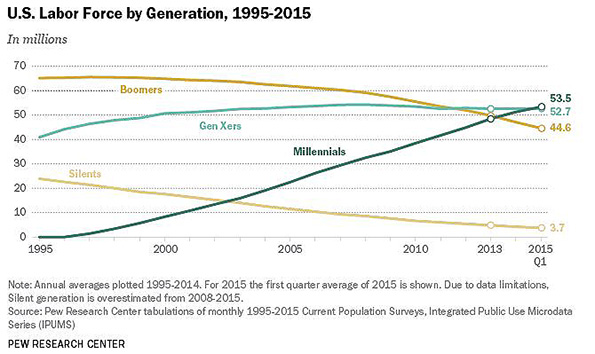Millennials now make up the largest portion of the American workforce.
(Chart: Pew Research Center)[1] And it’s worth noting that, with 90 million volunteers, America’s largest employer is non-profit institutions. While non-profits don’t have a conventional bottom line, management philosophy is as key for charitable organizations as it is for businesses. We must steward our resources for maximum effectiveness in order to better concentrate on mission.
[easy-tweet tweet=”Millennials now make up the largest portion of the American workforce” user=”#RobHoskins”]
And by resources, I don’t just mean money. Our greatest assets are our people. As the workforce grows younger, we must shape tomorrow’s leaders in how we manage and mentor them today. So what’s the secret for bridging generational gaps in the workplace?
[easy-tweet tweet=”As the workforce grows younger, we must shape tomorrow’s leaders by mentoring them today” user=”@RobHoskins”]
Two powerhouse individuals—Frances Hesselbein, head of the Hesselbein Leadership Institute (formerly the Peter F. Drucker Foundation for Nonprofit Management), and Joan Snyder Kuhl, founder of Why Millennials Matter—got together to tackle this very question. Hesselbein and Kuhl developed an enhanced edition of Peter Drucker’s Five Most Important Questions: Enduring Wisdom for Today’s Leaders (Wiley). This book—a collaboration of Drucker’s insight peppered with commentary from distinguished management gurus, contemporary entrepreneurs and dynamic millennial leaders—brings clarity and purpose to any young influencer’s work while bridging the generational gap that may exist in their workplace.
[easy-tweet tweet=”Drucker’s insight brings clarity and purpose to any young influencer’s work” user=”@RobHoskins” hashtags=”#Drucker”]
Their work, alongside Drucker’s own, is vital to the questions workplaces and their Millennial employees are facing today. Here are Drucker’s five questions—that should form the backbone of any organization’s self-assessment process—coupled with key points modernized by some of today’s key young influencers:
[easy-tweet tweet=”Drucker’s classic questions modernized by some of today’s key young influencers” user=”@RobHoskins”]
- What is our mission? It should be so short and clear that it will fit on a T-shirt. Keep it always in front of you as the measure against which all decisions are made.
- “Preserve the core, yet stimulate progress.” – Jim Collins, Business Consultant, author Good to Great
- “Never subordinate the mission in order to get money.” – Frances Hesselbein and Snyder Kuhl
- “Make sure that the results you achieve when you succeed in your mission are important to you.” – Marshall Goldsmith and Dr. Kelly Goldsmith, Stakeholder Centered Coaching
- “Define success in nonfinancial terms, put it on paper and call it a manifesto. Keep it in front of you to remind you what’s important.” – Michael Radparvar, Holstee
- Who is our customer?No matter what you call them—donors, students, patients, clients—ultimately you must decide WHO must be satisfied for your organization to achieve results.
- “Customers are never static. Hence, the organization that is devoted to results will adapt and change as they do.[2]” – Peter Drucker
- “Our business is not to please everyone casually but to please our target customers deeply.” – Philip Kotler, Strategic Marketing guru
- “Organizations, big and small, old and new, global and local, have to think of their businesses as in service to the customers and build their value proposition around it. In a corporation, the ultimate truth—the ultimate measure—is determined by the customer.” – Raghu Krishnamoorthy, GE
- “Only by recognizing the needs and motivation of collaborates will you create a system that propels forward the mission (and primary customers) that inspired you in the first place.” – Luke Owings, coach
- What does the customer value? What satisfies our customers’ needs, wants and aspirations is so complicated that only they themselves can answer it. It requires that you ask, then LISTEN to their answers.
- “Customers value a leader and a team who have the ability to listen and the courage to challenge the business-as-usual environment, all in service of the yearnings of the customer.” – Jim Kouzes, speaker
- “Welcome to the customer revolution, where you are no longer in charge. Today, customers expect to be helped at the time when they want to be helped and on their Companies that get this are already reaching new heights and many are revolutionizing their industries.” – Michael and Kass Lazerow, Buddy Media
“When it comes to providing the very best product ore service, [you] should never stop at the first, simplest, or most available answer. [You must] dig, frame and reframe, and explore all the angles to help customers discover deeper truths about their ideal experience.” – Nadira Hira, writer
- What are our results? You further the mission when you determine then measure how lives or condition are changed by your organization—people’s behavior, circumstances, health, hopes and above all their competence and capacity.
- “Drucker knew that, ‘Results are the key to our survival’[3] as institutions. If results are our goal, they must also be our test.” – Judith Rodin, Rockefeller Foundation
- “The ultimate impact of exploring outcomes is influence.” – Bernard Banks, West Point
- “Set incredibly ambitious goals. Chase them with fervor. And then move the finish line far off into the distance.” – Adam Braun, entrepreneur
- What is our plan? After self-assessment, you must create a plan that is a concise summation of the organization’s purpose and future direction. It transcends today while guiding and informing it, providing a framework for goal setting and mobilizing resources to get the right things done.
- “It takes [a plan] to identify the real barriers to end user adoption, to construct a supply chain, to raise money, to launch a new product or service, to gain distribution and to bring closure to the strategic goals.” – Kasturi Rangan, Harvard Business School
- “The best way for leaders to know they have done effective planning is to see their organizations stand the test of time.” – Juana Bordas, Mestiza Leadership International
- “You cannot translate a vision without a clear plan, for that is the tangible matter that people can wrap their arms around once you have successfully inspired them to join forces with you.” – Caroline Ghosn, Levo
Take to heart these questions and quotes and you will be well on your way to creating a culture where Millennials powerfully and creatively contribute to furthering your mission. Remember that being able to communicate effectively to Millennials in their style is key to unlocking and unleashing their productivity.
[easy-tweet tweet=”Communicate to Millennials in their style to unlock and unleash their productivity” user=”@RobHoskins”]
Related:
- 6 Drucker principles for Leaders in 2016
- Millennials and the church
- 4 Drucker principles for better parenting






